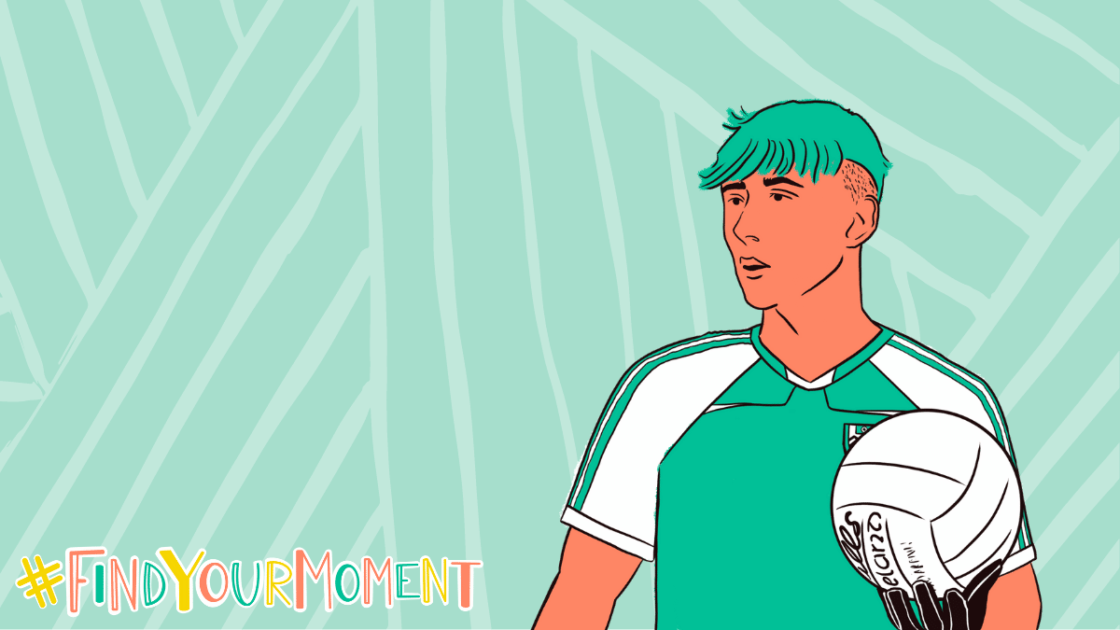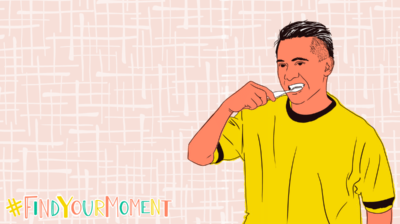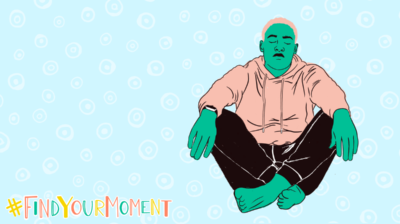What is grounding and how can it help me?
Learn about the simple meditation technique that helps you to manage stress and reconnect with the present.

What is grounding?
Grounding is a type of meditation that helps put you back in touch with the present moment by focusing attention on the physical world around you. Grounding exercises are quick and easy to try for yourself, and you can use them as a coping strategy in lots of different situations. They can be particularly helpful if you are feeling worried, stressed, distracted, or overwhelmed. Most grounding exercises draw your attention to the present by focusing on one or more of your five senses—sight, smell, hearing, taste, and touch. Often, grounding aims to help you reconnect with your body. Your mind can often live in the past or the future, but focusing your attention on the physical sensations in your body can be a powerful way to return to the present.
The term ‘grounding’ is also used to refer to a practice known as earthing. Earthing is a technique that involves doing activities that aim to “ground” or electrically reconnect you to the earth. This is a different practice to the type of grounding discussed in this article.
Is grounding the same as mindfulness?
Mindfulness is the ability to be aware of what’s happening in the present moment, both inside of your body and in the world around you, without judgement. You can think of grounding as the first step in practising mindfulness because it brings you into the present moment. People often use a grounding exercise at the beginning of a mindfulness meditation to help them get into the right headspace, particularly when they have a lot on their minds. Grounding exercises can also be helpful on their own.
What can grounding help with?
People find grounding exercises useful for supporting their wellbeing in lots of different ways. You can think of grounding as a tool that you can add to your self-care toolkit; no two people will use it in exactly the same way or for the same reasons. It’s also important not to rely too heavily on techniques like grounding exercises to support your mental health. Below are some of the ways in which grounding can help improve your mental wellbeing:
Managing worries
Grounding exercises can be a great temporary support if you’re feeling worried or anxious. Worrying rarely feels good, but it can sometimes be useful. Worry can draw our attention to problems that need to be addressed, and can even act as a motivator for making positive changes when these problems lie within our control. However, if you find yourself regularly worrying about things that are outside of your control, this isn’t helpful. In such cases, grounding techniques can help shift your focus away from the worry and back to the present.
Coping in stressful situations
Experiencing stress is a normal and understandable reaction when you’re navigating a challenging situation. While it happens to everyone from time to time, it’s distressing to find yourself stuck in an environment where you feel your stress levels become overwhelming. In situations like this, a quick grounding exercise can help you manage your emotional reaction and feel more calm and in control.
Combating overthinking
Grounding can be helpful for reducing overthinking. If you find yourself continuously thinking the same thoughts about the past or future that are upsetting you, you can use grounding exercises to help guide your attention away from those thoughts and towards the here-and-now.
Improving your focus
Lots of people use grounding to help improve their focus and concentration. If you’re struggling to complete a task because your head is muddled, grounding techniques can help clear your mind so that you can concentrate better. This can be useful if you’re doing homework or coursework, or getting ready for an exam. Athletes can also use grounding exercises to get into the zone before a game, race, or performance.
Practising mindfulness
Grounding exercises are often used as part of mindfulness meditation. If you get home after a long stressful day, meditating can feel like the last thing you want to do, even if you know it would help you unwind. When your state of mind is distracted and unfocused, grounding can pull you back to the present moment and help you to enter a mindful headspace.
How can I try grounding for myself?
There are a lot of simple exercises that you can use to practice grounding. These exercises are quick and easy to try and they become more effective with practice. Be patient with yourself and don’t feel discouraged if you don’t get the benefits you’re hoping for right away. Grounding exercises can be grouped into two categories: physical and mental.
Physical grounding techniques help you to focus on the present by interacting with the physical world around you using at least one of your senses. Mental grounding techniques are done within the mind, which means you can use them in many different situations. Here are some grounding exercises you can try:
Body scan meditation
Some people like to sit in a comfortable chair or lie down for this activity, but you can try this anywhere that works for you.
- Start by taking some deep breaths
- Try and breathe slowly and evenly if you can, in through your nose, and out through your mouth
- As you are breathing, start paying attention to how your body feels right now. Start by focusing on the top of your head, then slowly scan down through your body. Are you feeling warm or cold? Are you feeling comfortable or uncomfortable? If you find any part of your body is tense, you can try relaxing it, but the goal of this exercise isn’t to change anything
- Keep scanning through your entire body until you reach your toes
Hand scanning
This exercise is similar to body scan meditation, but it’s easier to do if you’re around other people or in public.
- Start by clenching your hands into fists
- Hold for a few seconds before releasing the tension
- Now, focus as closely as you can on how your hands feel. Repeat this a few times, paying attention to how it feels when you release the tension
The categories game
The categories game is a useful technique because you can play it anywhere.
- First, choose a category for yourself. It could be animals, types of food, names, musical instruments, etc.
- Try and name ten things in that category
- If you want more of a challenge, you can try and name something in that category that starts with each letter of the alphabet
The favourites game
This one is similar to the categories game. Try and think of as many of your favourite things as you can. This could include your favourite season, your favourite song, your favourite colour, and so on. You can either answer out loud or in your head.
Use a grounding object
Select an object that you can carry in your pocket to help ground yourself. The object could be anything, like a small stone, a keyring, or a fidget toy. If you are feeling distracted or overwhelmed, hold the object and focus your attention on it. Think about how it feels in your hand—how heavy it is, if it’s hot or cold, what the texture is like.
The 5 4 3 2 1 technique
This exercise grounds you by engaging your five senses—sight, smell, hearing, taste, and touch. You can start by taking a couple of deep breaths. Try and breathe slowly and evenly if you can, in through your nose, and out through your mouth.
Look around you and find the following:
- 5 things you can see
- 4 things you can feel
- 3 things you can hear
- 2 things you can smell
- 1 thing you can taste
Finish with a deep breath.
Mental exercises
Focusing your attention on a mental exercise can be a good way of distracting your mind from worry and stress. You can use one of these exercises or create your own.
- Name all the objects you see around you
- Try spelling some words backwards
- Try and name all the counties in Ireland
- Describe all the steps in doing something you know how to do very well, e.g., how to make a cup of coffee.
- Count backwards from 100 in 7s
What if grounding is not for you?
Lots of people use grounding exercises to help themselves calm down, manage stress, improve their focus, and cope with difficult situations. However, not everyone has a good experience with grounding. If you try some grounding exercises and they don’t have a positive impact on your life, or if you simply don’t like them, that’s ok. It doesn’t mean that you’re doing the exercises wrong or that there’s something wrong with you. Grounding is just one of many ways that people support their mental wellbeing. There are lots of other ways in which you can practise self-care.
Feeling overwhelmed and want to talk to someone?
- Get anonymous support 24/7 with our text message support service
- Connect with a trained volunteer who will listen to you, and help you to move forward feeling better
- Whatsapp us now or free-text SPUNOUT to 50808 to begin.
- Find out more about our text message support service
If you are a customer of the 48 or An Post network or cannot get through using the ‘50808’ short code please text HELLO to 086 1800 280 (standard message rates may apply). Some smaller networks do not support short codes like ‘50808’.






